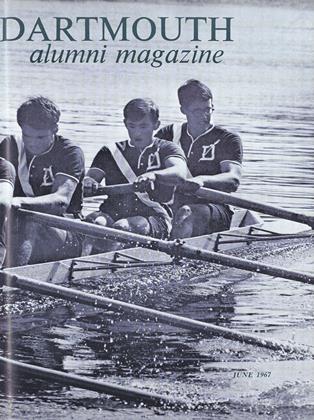To promote a more vital link between business and education, the Tuck School at Dartmouth has been successfully developing for nearly three years a program called the Tuck School Associates. This plan was established in 1964 with the following statement of purpose:
The Associates of Tuck School is an organization of business concerns joined in a cooperative relationship with an outstanding business school faculty to develop leadership talent and the fund of new knowledge which American business must have to prosper and to serve our society. The program is premised on the assumption that business and education can and should work hand in hand to achieve that common end. The School serves as the laboratory in which scholarly basic research is conducted and the collection of data and ideas from both the needs and the experience of business are assimilated. Business serves as the proving ground for the application and testing of new and improved ideas. The common objective is greater managerial competence, both present and future.
Today, approximately eighty corporations representing the major areas of industry and finance and some individual businessmen are Tuck Associates. They have participated in conferences, received research and scholarly publications from the Tuck School faculty, enjoyed ongoing dialogues with the faculty and administration and, in many ways, have contributed to the development of the School.
An Associates Advisory Committee of 54 top-level industrial and financial leaders assists Dean Karl A. Hill '38 and Assistant Dean Robert Y. Kimball '46, executive secretary of the Associates, in the affairs of the program. The group is headed by five honorary chairmen who have had close contact with Tuck School over the years: Albert Bradley '15, director and former chairman of the board of General Motors Corporation; J. Frank Drake '02, former chairman of the board of Gulf Oil Corporation; John H. Hinman '08, former chairman of the board of International Paper Company; Sigurd S. Larmon '14, former chairman of the board of Young and Rubicam, Inc.; and Nathaniel Leverone '06, director and founder chairman of Automatic Canteen Company of America.
One of the necessary objectives in establishing the Tuck Associates was the broadening of the financial base of the School from which its ambitious program of expanded activities could be launched. The Associates have responded to many vital needs by subscribing amounts ranging from $1,000 to $10,000. Corporations and individuals annually subscribe to single membership of $1,000 each, and many larger corporations hold multiple memberships. The funds are given for unrestricted use and have gone into a variety of projects, with the main emphasis on research, the results of which benefit the business community.
Another important objective was the development of an effective communications channel to allow productive intellectual relationships between successful business leaders and educators. It has been found that the ideal forum for exposition and discussion of new ideas and concepts based on research is the small conference sponsored by faculty members. Four of these conferences have been held so far.
The first conference, in Hanover, presented research on the subject of Leaseversus Buy Decision. In some cases the industry participants maintained a working relationship with the faculty for months after the original meeting. The second conference, in New York, on Education for Tomorrow's Marketing Management reviewed the contributions being made to marketing education by new quantitative techniques and behavioral science research. A two-day conference last June was devoted to Computers inFinancial Management and introduced a large number of Associates to Dartmouth's time-sharing computer program and especially to advanced work in new computer languages and concepts developed at Tuck School. A fourth conference, in the fall, was concerned with today's highly competitive MBA placement situation. Still another conference in Hanover this month, June 5-6, will deal with Technological Forecasting.
Another avenue of communication with business leaders involves the distribution of faculty reports, case studies, articles, and books pertinent to their business interests. Associates are encouraged to visit Tuck to discuss business problems and thus have an opportunity to share their practical experience with tomorrow's business leaders. Participation by Associates in classroom discussions and lectures at the School has been particularly beneficial to students as they contemplate their future business careers.
It is hoped that the roster of Associates will include approximately 100 concerns and individuals within the next year since this is believed to be the optimum size for efficient operation. Dean Hill and Assistant Dean Kimball would be pleased to respond to requests for additional information.
 View Full Issue
View Full Issue
More From This Issue
-
 Feature
FeatureProphecy in Painting
June 1967 By ROBERT REID and DOROTHY BECK -
 Feature
FeatureThe Wallace Affair
June 1967 By C.E.W. -
 Feature
FeatureRETIRING FACULTY
June 1967 -
 Feature
FeatureAN ATHLETIC SUMMING UP
June 1967 By CLIFFORD L. JORDAN '45 -
 Class Notes
Class Notes1959
June 1967 By RICHARD G. JAEGER, JAMES W. WOOSTER -
 Article
ArticleThe Undergraduate Chair
June 1967 By ART HAUPT '67







